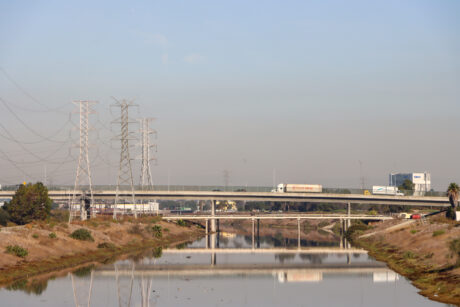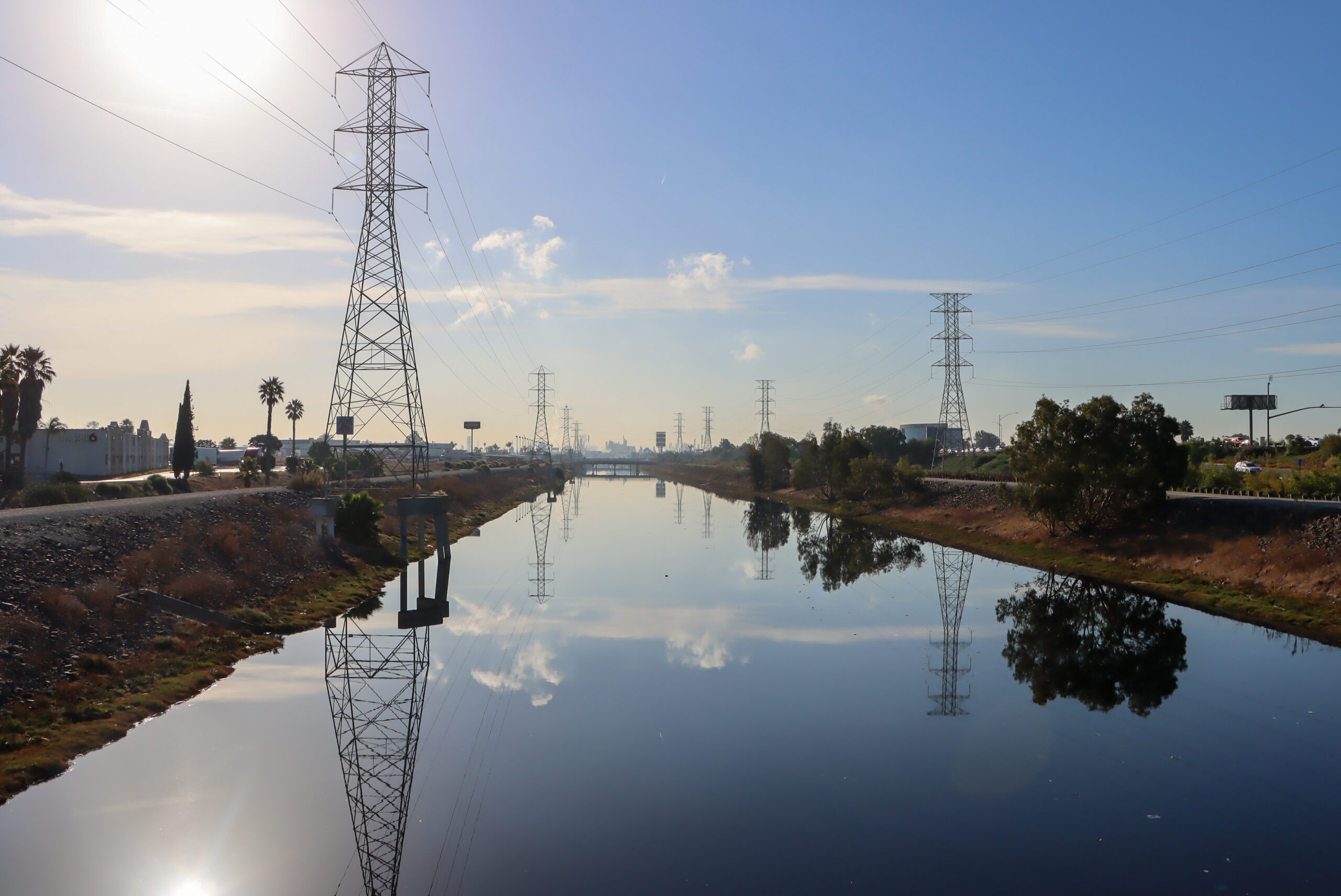The Dominguez Channel located in Carson, CA. runs 15.7 miles in the Southern Los Angeles County region and exits at the Los Angeles Ports. Hydrogen Sulfide has been hovering over Carson and disturbing the residents and those of the California State University, Dominguez Hills campus located approximately 2.5 miles north of the channel. Photo by Catalina Garcia
By Catalina Garcia, Staff Reporter
A foul odor, presumed to be Hydrogen Sulfide, has been hovering over Carson since the rainfall on Monday, Oct. 4. The smell has been ruled to be caused by decaying organic material along the Dominguez Channel, located approximately two and a half miles from California State University, Dominguez Hills.
The CSUDH campus life is affected by this smell, which is described to be similar to rotten eggs and “The Walking Dead,” meaning it smells similar to a dead body. Many of those on campus are part of the large community that lives in University Housing.
Residents like Crystal Butts, who lives in Phase Two of University Housing, have been struggling to keep away from the smell. Many have resorted to going home due to the smell getting worse as the days go on.
Butts said, “I normally always leave my windows open all the time to let in the fresh air, especially since we don’t have air conditioning in the apartments. So, since the smell has been here I’ve had to keep all the windows closed and the rooms can get hot.”
Some of the residents in University Housing and those in Carson don’t really know the effects of Hydrogen Sulfide can have on them and are concerned it is not healthy because the smell is so potent, especially since the odor has been around for days.
“Hydrogen Sulfide has a very low odor threshold […] So, you can smell it well below levels that would cause long-term harm,” Michael Willams said, Environmental, Health, and Safety Manager of CSUDH
On Oct.18, Williams met with a consultant and did samples of the gas levels in the air and tested for Hydrogen Sulfide in University Housing, Parking Lots, and inside and outside various buildings around the CSUDH campus.
Willams said that the results from the sampling came back as 0.00 part per million (ppm) for Hydrogen Sulfide, which is low on the metering scale that goes up to 10. Hydrogen Sulfide itself has 0.005 ppm.
Even though the results came back as low, Williams said precautions should be taken until the smell and Hydrogen Sulfide is completely gone. Those that live in the community and in the CSUDH campus are being affected the most.
As of Tuesday, Oct. 19, Los Angeles County Public health officials recommend that individuals avoid outdoor activities for an extended period of time between the hours 9 p.m. and 8 a.m.
“Everybody is different. Some people can be desensitized and other people can be more symptomatic at very low counts.” Williams said.
Some of the symptoms of breathing in too much Hydrogen Sulfide include; nausea and headaches.
“I don’t normally get headaches, so I haven’t experienced anything, But I wouldn’t be surprised if someone has,” Butts said.
Williams mentioned in order to keep your air safe and not breathe in the Hydrogen Sulfide as much, some suggestions include; keeping your doors and windows closed and not using your Air Conditioning/ heating units to reduce the amount of Hydrogen Sulfide coming into your room and home. Also, the best filtration that can grasp and hold onto the particles of Hydrogen Sulfide is Activated Charcoal filters and filtration systems.
Christopher Vera, a Criminal Justice major at CSUDH said, “It sucks being stuck inside without the windows open. I like being outside or at least being able to have a window open but can’t because it smells so bad.” Vera lives in a surrounding neighborhood of the CSUDH campus.

Priscila Iniguez, a PR, and Advertising major and Film and Television Major, lives in Carson said the smell hasn’t impacted her day-to-day life, “ I noticed the smell is worse at night […] We keep our doors and windows closed to keep the smell out. Other than that it is just inconvenient.”
Due to some residents of Carson feeling the need to buy air filtration units to take the extra precaution, there is a reimbursement program set up for those that have had to purchase such units.
If those in University Housing wish to buy and use an air purifier, they are allowed in the Phase Three Residents Hall and in the Phase Two Apartment Style dorms.
The Los Angeles County Public Works said in a town hall meeting that Williams attended that they are applying a non-toxic and bio-degradable deodorizer into the Dominguez Chanel in order to try and alleviate the smell, that is Epoleon.
The LA County of Public Works will install in the near future a system of 12 aeration devices to inject nanobubbles. These nanobubbles are to increase the dissolved oxygen levels in the channel over a three-month period.
County officials said that these precautions and actions that are being made are expected to alleviate the odor within a five-day period.
The levels on the CSUDH campus are at “nuisance” meaning that the smell is not considered hazardous and there is no immediate harm to those at our campus or around our campus.
There has been no announcement regarding the cancellation of sporting events or on-campus outdoor activities at this time. “This is due to the campus being around 2-2.5 miles away from the Dominguez Channel,” Williams said.
“The Emergency, Health, and Safety office is currently looking into some options of relief for the campus,” Williams said. He also mentioned that if the residents of University Housing are looking for some sort of relief they can call 2-1-1 or they visit the Dominguez Channel Incident page. The funding is open until Oct. 21, 2021, unless it is extended by Los Angeles County Public Works.

